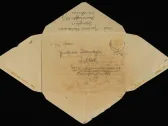Letter to 'Palestinian Partisans' Raises International Storm
Many internationally renowned figures have asked the Palestinians to end violence and terrorism, but a letter from the deputy commander of the Warsaw Ghetto uprising is causing a particular fuss.
Dr. Marek Edelman, the last of the uprising leaders still living, wrote an "open letter" to Palestinians this week, asking them to stop the bloodshed and enter into peace negotiations. But the letter has prompted a dispute among the remaining survivors of the uprising and their families, since in his letter Edelman does not mention the word "terrorism."
Moreover, the letter is filled with hints of comparisons between the Palestinians' fight and that of the ghetto residents. He addresses "the commanders of the Palestinians armed organizations and the partisan organizations, and the soldiers of the armed Palestinian organizations."
Edelman, who still lives in Poland, sent his letter via his old friend, Simha Rotem - known as "Kazik," a well-known fighter in the uprising. Edelman starts his letter with an overview of the uprising against the Nazis, hinting at the difference between the Jews' struggle, and that of the Palestinians.
"In 1943, we fought for the life of Jewish society in Warsaw. We fought solely for life, not for territory and not for national identity ... our weapons were never aimed at a defenseless civilian population. We did not kill women and children."
He goes on to say that, "to this day, a partisan struggle in cities has never succeeded anywhere in the world, but the armies we fought against also never won. This war also will not lead to any solution. Once again, blood will be spilled needlessly and people on both sides will lose their lives."
Edelman further "rebukes" the Palestinians by comparing their deeds to those of the Jewish fighters by saying, "we never gambled with our lives. We never sent our soldiers to a certain death; after all, you only live once. A man must not take another's life. It is time for everyone to understand that."
He advises the Palestinians to learn from the Irish, where "ardent enemies sat round the same table," and from the fall of the Communist regime in Poland, "which was brought down without a single shot."
Edelman then addresses both sides: "You and the state of Israel must alter your approach ... You must want peace in order to save the lives of hundreds if not thousands of people to create a better future for your relatives and children." He explains that his decision to write to "the commanders of the armed organizations" comes from his experience which has found that they have the biggest influence, compared to that of civil and political elements.
Edelman says that a possible mediator does not have to be "a politician. A man with an unshakeable moral authority, who puts living in peace and honorably above all political goals, is preferable."
In this, Edelman is perhaps hinting at a hidden desire to be called upon as such a mediator, an idea that his friend Rotem does not reject altogether. "I don't think he would refuse to being a mediator, and as a non-Zionist Jew, he also has the right talents," says Rotem.
Edelman, a caridologist by profession, is now in his eighties. He was a member of the Bund, the Marxist-Jewish party that opposed Zionism, and represented the movement within the Jewish Fighting Organization (ZOB) when he joined it in 1942.
He viewed Poland as his homeland and remained there after the war and after Israel's independence. Edelman maintained contact with his fellow resistance leaders who moved to Israel, though there was always an ideological clash.
Edelman told Ha'aretz his use of the word "partisan" was not meant to draw comparisons between the Palestinians and the ghetto fighters, nor to put a positive light on their activities. "The word `partisan' denotes all war by citizens, and is not necessarily an expression of honor," he said.
Despite his views, Edelman has visited Israel on numerous occasions, especially after the collapse of the Polish Communist regime, the latest visit being just a few months ago.
Pnina Frymer-Greenspan, who fought under Edelman's command in the uprising, criticized the comparisons drawn between the Jewish fighters and the Palestinian terrorists. "There is no need for such a comparison," she said, "it pains me. I also think its very problematic that he does not call them `terrorists.'" She does however back his call for negotiations.
Prof. Israel Gutman, one of Israel's foremost historians on the Holocaust and himself a participant in the uprising, was far more critical. "Edelman has been filled with hate for Israel for years," he said. "At the time, he claimed that [former prime ministers Menachem] Begin and [Yitzhak] Shamir has massacred Arabs and that [David] Ben-Gurion was `a little Jew from a poor town' unworthy of being considered a statesman."
Gutman links Edelman's sentiments to his days with the Bund which he says was "so hostile to Zionism and stood out with their provocations against anything Jewish - opening soup kitchens even on Yom Kippur."
Rotem said Edelman met Palestinian representatives at his Lodz home yesterday. "The Palestinians telephoned Ramallah from his home and the response was, `we'll see soon.' He hopes this means they will agree to a meeting soon, and assumes that the Israelis will not refuse such a meeting," said Rotem.
Want to enjoy 'Zen' reading - with no ads and just the article? Subscribe today
Subscribe now


















